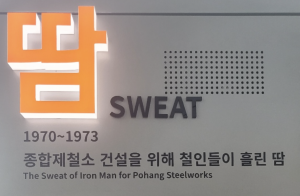Pohang: POSCO Museum
Photo essay of wall text of POSCO Museum of Pohang

Photo essay of wall text of POSCO Museum of Pohang

XXX

A brief essay about St. Louis' notorious eminent domain history--
--along with 2 recent St. Louis Post-Dispatch articles about "urban renewal" projects that are scheduled to reoccupy the Mill Flats area, which hosted the most notorious episode of displacement of African-American communities: the Chouteau Greenway project (will it serve or displace low-income St. Louisans?); and SLU's Mill Creek Flats high-rise project, which certainly will, and whose name seems to me an especially tone-deaf if gutsy move...
https://humanities.wustl.edu/features/Margaret-Garb-St-Louis-Eminent-Domain
While the practical yield of such circumscribed inquiry has been enormous, exclusive focus on molecularlevel phenomena has contributed to the increasing “desocialization” of scientific inquiry: a tendency to ask only biological questions about what are in fact biosocial phenomena [1].
What would happen if race and insurance status no longer determined who had access to the standard of care?
Sometimes public health crises, such as the AIDS pandemic in Africa, can lead to bold and specific interventions, such as the campaign to provide AIDS prevention and care as a public good [54].
In this struggle, equity in healthcare is our responsibility.
The main arguments in the article are that globalization has created new threats to the public health and security on a global scale, with biological threats the foremost concern. "Biosecurity" is the goal, which looks at public health preparedness at all levels (local, national, international, global) with four domains: "emerging infectious disease; bioterrorism; the cutting-edge life sciences; and food safety." Despite increasing defenses and plans for current threats, the article notes that we need to become better at predicting new threats and identifying risks to biosecurity while adapting to changing political, environmental and infrastructure factors that create difficult ethical decisions.
The program goal is to "help prepare for, protect against, respond to, and recover from a growing array of natural and human-caused risks and threats in New York State and around the world" (in mission statement) by providing education, research and training opportunities in homeland/cybersecurity to its students.
The article looks at how a French law, the "compassion protocol" that gives legalizes undocumented immigrants with serious illness, was interpreted and executed by within the country. It discusses how the law is a humanitarian action and public health concern, and the difficult moral position medical professionals are put in when becoming an examiner for this department in the government.
The policy addresses public health in Title IV as part of the Major Disaster Assistance Programs. Section 42 states that the President may provide assistance for and coordinate emergency response to affected areas.
The policy addresses the immediate dangers to public health (weapons of mass destruction/ hazmat incidents) and the environmental hazards that may come from first responders attempting to decontaminate victims.